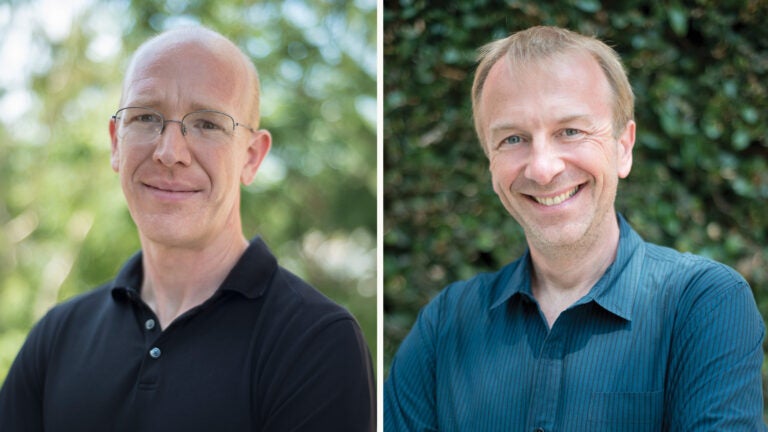
Two USC Dornsife scientists elected senior members of the National Academy of Inventors
Two professors at the USC Dornsife College of Letters, Arts and Sciences have been named senior members of the National Academy of Inventors (NAI).
Travis Williams, professor of chemistry, and Peter Kuhn, Dean’s Professor of Biological Sciences, along with 9 other USC scholars, join a global cadre of 553 NAI senior members who foster a spirit of innovation within their communities and institutions while educating and mentoring the next generation of inventors.
“These inductions to the National Academy of Inventors celebrate the highest level of academic excellence and also help to demonstrate the incredible power of university faculty to solve real-world problems,” said USC Dornsife Dean Amber D. Miller.
Sustainability solutions through chemistry
Williams who holds 10 patents and numerous awards recognizing the inventive value of his work, says being named an NAI senior member is a result of USC’s visionary support of innovators like himself.
“NAI recognition falls out of the university’s deliberate decisions to invest in patenting bizarre things from my lab, tenuring someone who quit working on what he was hired to do, and stoking innovation through the Wrigley Prize and the [National Science Foundation’s] I-corps hub,” he says. “While I’ve been an enthusiastic product of my environment, USC Dornsife and the university engineered this through a generations-old commitment to innovation and public impact.”
Williams’ research has borne considerable fruit, including Closed Composites, which aims to recycle carbon fiber materials from old aircraft parts, and Catapower Inc., converting used oil from deep fryers into biodiesel and environmentally sound antimicrobial agents. Williams has even co-developed a method to turn plastic waste from the Great Pacific Garbage Patch into compounds to make pharmaceuticals and other useful products.
Williams says an important component of his work is imparting his inventive spirit onto new generations whose ideas can benefit society.
“My graduate students will tell you that I drive them to think about how they impact the way the world works if they can make projects successful,” he says. “My undergrads should tell you that I paint a global picture of the broader importance of their chemical education early and often.”
His commitment to mentorship has been recognized with an Elbert K. Fretwell Outstanding Educator Award, a USC Center for Excellence in Teaching, Faculty Fellowship, a Stanford Centennial Teaching Award and a California Institute of Technology ASCIT Teaching Award.
And his teaching efforts have extended beyond USC students, including a program that invited Boy Scouts to the USC Wrigley Institute for Environment and Sustainability to support work in ocean plastics recycling and learn how Wrigley Institute scientists manage the institute’s sustainability footprint.
“We can make ourselves a uniquely, globally competitive university by continuing to facilitate vertical integration of our faculty into the broader scope of education, like K-12, and into broader society,” Williams says. He believes the work aligns with USC Dornsife Dean Amber D. Miller’s Academy in the Public Square initiative, which changes the way academic expertise is made available beyond the university.
“Not many places do that as well as we do,” he says. “It serves USC’s unique value in American education — and it’s fun!”
Reimagining cancer care for the precision medicine era
After early success in drug development for cancer, Kuhn turned his sights to leading the charge in advancing liquid biopsies, a type of blood test that detects and characterizes circulating tumor cells. Although he focuses on breast cancer, a disease his mother faced, his inventions have been applied for treating prostate cancer as well. His technology has been in use for oncology care since 2016.
A personal highlight was when others started using his invention and the thrill derived from seeing that success: A colleague published a clinical study showing that one of his inventions was effective in differentiating between which patients would benefit from one treatment over another in fighting cancer.
“That was the best day of my life, and I didn’t even know about the study before it came out,” Kuhn said with a smile. “It wasn’t just seeing this striking result. It was knowing that they could do it without me. There are a lot of hurdles, and it’s an incredible feeling when something makes it through — and makes a difference for patients.”
He appreciates the NAI honor as a milestone, but also keeps his sights set firmly on the future.
“This recognition is fantastic,” he said. “It’s a marker along the journey; it demonstrates a path. But it’s really about where that path leads.”
Kuhn sees his work in science and engineering as one spoke in a larger wheel that includes the clinician and the patient. Indeed, he notes, patients have a very important role to play.
“My ultimate dream is that every woman not only gets screened for breast cancer but also participates in research,” he said. “I want it to be seen as the most obvious and normal thing to do. I’d love to see a research environment in which everybody plays their own part — and is proud of playing that part.”
About the National Academy of Inventors
The NAI was founded to recognize and encourage inventors with U.S. patents, enhance the visibility of academic technology and innovation, encourage the disclosure of intellectual property, educate and mentor innovative students, and create wider public understanding of how its members’ inventions benefit society. The academy now comprises 4,600 individual members at more than 300 universities, governmental agencies and nonprofit research institutes worldwide.
Featured USC Dornsife Faculty:
Peter Kuhn, University Professor, Dean’s Professor of Biological Sciences and Professor of Biological Sciences, Medicine, Biomedical Engineering, Aerospace and Mechanical Engineering and Urology
Travis Williams, professor of chemistry